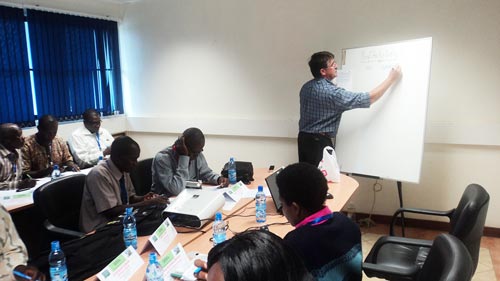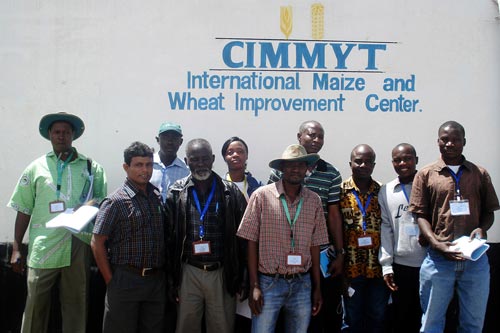By Florence Sipalla/CIMMYT

CIMMYT and partner organizations are helping to build the human capacity of seed companies, which contribute to food security by ensuring farmers have access to quality seed. Certified seed is one of the most important inputs farmers need to improve their grain yields and livelihoods.
CIMMYT organizes regular training sessions for seed companies in different countries across Africa, in collaboration with the Seed Enterprise Management Institute (SEMIs) project, which is funded by the Alliance for a Green Revolution (AGRA) and hosted at the University of Nairobi College of Agriculture and Veterinary Services. “AGRA realized that many seed companies across the continent lacked knowledge on seed production, processing, marketing and aspects of seed quality,” said David Ndung’u, project manager for the SEMIs project. Both AGRA and CIMMYT receive funding from the Bill & Melinda Gates Foundation. In the past three years, SEMIs has trained more than 450 seed producers from 17 Sub-Saharan African countries, including Burkina Faso, Ethiopia, Ghana, Kenya, Liberia, Malawi, Mali, Mozambique, Niger, Nigeria, Rwanda, Sierra Leone, Tanzania, Uganda and Zambia. “This training has been identified as one of the triggers for the huge increase in production of high-quality seed by AGRA-funded seed companies all over Sub-Saharan Africa,” Ndung’u said. The seed production course, taught by John MacRobert, seed systems lead for CIMMYT, is among the most popular with seed companies, Ndung’u said.
 The course focuses on challenges companies face in managing hybrid maize seed. “John brings a wealth of experience in this field,” Ndung’u continued. “He is helping seed companies plan better and improve their seed production capabilities.” MacRobert’s book, Seed Business Management in Africa, is included in the course materials. CIMMYT’s Drought Tolerant Maize for Africa project (DTMA) also utilizes MacRobert’s book in training sessions for seed company staff. CIMMYT has conducted seed production management courses in Angola, Ethiopia, Swaziland, Tanzania, Uganda and Zimbabwe, training more than 200 personnel from the private and public sectors over the past six years.
The course focuses on challenges companies face in managing hybrid maize seed. “John brings a wealth of experience in this field,” Ndung’u continued. “He is helping seed companies plan better and improve their seed production capabilities.” MacRobert’s book, Seed Business Management in Africa, is included in the course materials. CIMMYT’s Drought Tolerant Maize for Africa project (DTMA) also utilizes MacRobert’s book in training sessions for seed company staff. CIMMYT has conducted seed production management courses in Angola, Ethiopia, Swaziland, Tanzania, Uganda and Zimbabwe, training more than 200 personnel from the private and public sectors over the past six years.
The trainings emphasize cooperative learning while providing technical information and management tools. CIMMYT seed systems specialists also made more than 80 follow-up visits to seed company partners in 2013. Ngila Kimotho, the CEO of Dryland Seed Company, based in Machakos, Kenya, attended a 2008-09 seed course. “The course was very useful in enhancing my understanding of seed business management through the value chain – from research to the market,” Kimotho said. “My knowledge in the field has greatly improved, as I didn’t understand the business initially,” added Kimotho, whose background is in food technology. In 2011, Gloria Kimotho, Kimotho’s daughter, attended a CIMMYT course in Zimbabwe and is now actively involved in the Dryland Seeds management team. SEMIs and CIMMYT are also collaborating in field demonstrations of DTMA varieties – a way to promote adoption by farmers because seed companies are able to pick suitable products by closely watching field performance. “Having many seed varieties is good for diversity,” explained Mosisa Worku Regasa, a seed systems specialist. “With the emergence of maize lethal necrosis (MLN) disease, many maize varieties from seed companies in eastern Africa are susceptible to the disease.” An efficient seed system will contribute to the rapid scale-up and dissemination of MLN-resistant varieties.
“To be a great ‘seeds man’ you really need to understand your plants well,” said Ndung’u, who worked as a visiting scientist for DTMA under CIMMYT maize breeder Dan Makumbi. “My knowledge and understanding were greatly enhanced during my time at CIMMYT
 Capacity development
Capacity development